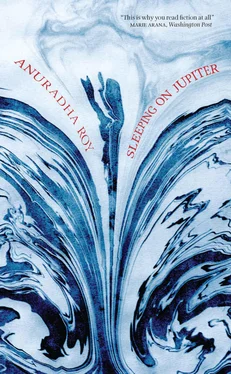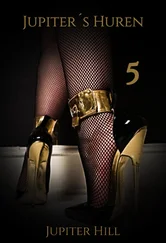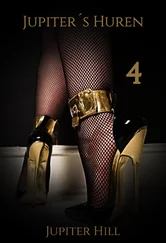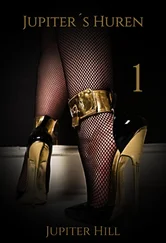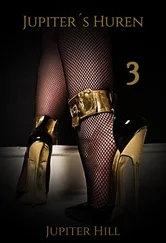Yet the afternoon filled him with contentment. Usually he had no interest in the pilgrims he had to conduct around the temple. They were work, and when they were gone it was over. But these people — he wanted to show them around Jarmuli now, take care of them, see that father and daughter came to no harm, feed them the special fish and rice at Manoj’s lean-to behind the bazaar, then the warm, succulent sweets at Mahaprabhu. Take them to Johnny Toppo’s tea stall.
That tea stall! The shadows from the night before lifted as if by magic, the mid-afternoon sun dazzled. Badal went off to the lane where he had parked his scooter. He would eat something. Then he would go and look for Raghu. Maybe he was back and waiting. At long last, he would give him the mobile. He sang aloud as he turned the corner. One of Johnny Toppo’s songs, sung every day:
Dark, gleaming gold are my love’s bare legs,
Deep in the emerald paddy.
Red as rose are her bangles that shine,
Bright in the emerald paddy.
Wary as a thief is that watching egret
White in the emerald paddy.
And the rain came again and again that night,
Soaked all the emerald paddy.
Business was slow at the tea stall. Not many people on the beach and so many women fasting because of Shivaratri, it halved the number of customers. Johnny Toppo was by himself, pottering about. White spikes of stubble stuck out from his chin and his bald head shone. Raghu had wanted time off and he had told him to disappear. It was a relief to be rid of that boy. Johnny Toppo was sure the rascal was stealing; he was a sly fox, that one. Just thinking of Raghu today was putting him in a bad temper even though he had woken that morning feeling as light as the froth on his tea. More often than not, he found himself grinning about nothing even when alone, and at times he was gleeful without reason, like a simpleton or a child. The other day he had been gazing at the madman watering his dry twig and then making his daylong sorties into the water when he had abandoned his stall and sprinted off in daft pursuit. He wasn’t thinking, he hadn’t planned it, it was the end of a tiring stint, almost night, and there he was, racing the lunatic into the froth and back again, shouting nonsense, and then the two of them had laughed like hyenas and pissed into the sea side by side. Yet today he could not stand the sight of that filthy, ugly loon. And he wished his customers would disappear as well. But he needed to earn, didn’t he? He had to grin at tourists and brew tea and grin again. Some days he wanted to turn his table into a raft and sail off into the Bay of Bengal. He’d be washed up on an island nobody knew, and live on fresh fish, beeris, and palm toddy. And not one drop of tea.
He was lost in these thoughts when Nomi appeared and said too close to his ears, “One. With ginger and cloves.”
For some reason, whenever he was startled this way, pinpricks of an itch started all over him and took time to subside. He scratched his head, then scratched his shoulders, fought not to scratch his armpits and groin. He tried to summon up a smile and his patter. “Done shopping today? Gone to the temple? Buy a few saris while you’re here. And don’t forget to eat fried prawn by the sea. That’s what Jarmuli’s famous for! That and my tea.” It was what he rolled out for everyone and he forgot that she had heard it all from him twice or three times already. This girl made him uncomfortable, he could not tell why. Maybe the way she kept staring at him with those big, black eyes of hers.
On the beach, the madman scurried around, planting his twig, watering it from the sea, stepping back to admire it, then plucking it out from the ground and planting it in a better place.
Johnny Toppo had not covered the scar on his neck with the cotton square he used sometimes as scarf and sometimes dishcloth. He felt her eyes upon his patch of raw, buckled-up flesh. Quickly, he adjusted the cloth. He straightened, took shelter behind his stove. He stirred his pan with great vigour, he clattered dishes and cups around. His smile was gone, he was not singing.
Nomi strolled down to the water, kicked a dented plastic bottle out of her way. It flew seaward in a shower of sand and the madman rushed out chasing it into the waves. She turned around to look at Johnny Toppo at his stall pounding the ginger and cloves in his mortar as if they were fighting back. He picked up a jar filled with what looked like black dust and tossed some into the water boiling on his stove. When she came back, the mixture was bubbling, dark and frothy like the beers she had drunk in Germany. She took a deep breath of the tea in the pan and said, “Sometimes I feel I’ve seen you before. Don’t you feel sometimes. . as if you’ve seen someone before, been somewhere before?”
“I don’t think too much, or feel too much.” Johnny Toppo poured out her tea. “If you think too hard you just get a headache and lose your hair. And I don’t have any hair to lose, see?”
They stood in silence. She finished the tea in her cup and peered inside it. She said, “Do you know, people tell fortunes from tea leaves?”
“I don’t know. People will say anything to make money.”
“No, really, I had my fortune told once. And the woman — she was a very old woman in New York — that’s in America — her room had bead curtains and a mini tree — this small — in a pot by the window. She told me that if there was one place I should visit on earth, it should be a place in the east by the ocean. So here I am.”
“My tea has no leaves, it’s all boiled up. I can’t tell you where to go next.”
Nomi smiled and ran her finger over her beads. “Can I have another?” She was not going to leave, Johnny Toppo could see. He poured milk into the pan and more water, tipped in a spoonful of sugar.
“You sing so often of trees and flowers and paddy fields. Are you a farmer or a gardener?”
“I am what you see. I sell tea and biscuits.”
“But wasn’t there a time when you looked after plants?” She sounded braver now, her voice was louder.
“Everyone’s looked after plants some time or other. That crazy goat out there? He’s watering one, see? You must have had a plant or two in your life as well.”
She blew on the tea he handed her. “I mean, did you ever look after plants as your work? Somehow, because of your songs. .”
“No,” Johnny Toppo said. “And it will be ten rupees for the tea.” He turned away from her and stood behind his stove. His bones stood out more than usual now, as if he had sucked in his hollow cheeks and sealed his mouth against further talk.
“I’ll take one of your umbrellas,” Nomi said, “and sit here.”
“I have no umbrellas for hire today,” Johnny Toppo said. He had three umbrellas propped up in the iron bucket behind him, but if she persisted, he would say they were spoken for.
She looked out to the sea. Johnny Toppo clattered his pots and pans. Then she said, “Do you know of an ashram here in Jarmuli?” Her gaze was fixed on the madman, who was now stamping on the twig he had been watering.
A band of pilgrims passed them just then: young women, men. They smiled as they went down the beach, swaying and singing.
“Ashram?” Johnny Toppo said, after the pilgrims had gone. “There are hundreds of ashrams here, this is a temple town. All you hear is the sea and bells. And fools like these every five minutes, braying like donkeys, buying an advance booking to heaven. Temples. Ashrams. Devotees. That’s Jarmuli.”
“A big ashram. Run by a guru. It had a school. Since you’ve lived here for many years, surely you’d know?”
Johnny Toppo stalked towards her and growled, “Who’s to tell how long I’ve lived here? I’ve lived in a thousand places. Tomorrow I might be somewhere else. All ashrams are run by gurus, how do I know where yours is?”
Читать дальше
